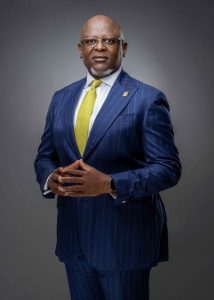Business
IT’S FIRSTBANK’S FINEST HOUR…Dazzles stakeholders with growth across key metrics

IT’S FIRSTBANK’S FINEST HOUR…Dazzles stakeholders with growth across key metrics
Rising from a lower profit margin of N10.2billion and a debilitating Non-Performing Loan portfolio of 45 percent in 2015, to an impressive profit of N147billion and a significantly lowered NPL rate of 5.6 percent in 2022, FirstBank has proven that its back-to-back profit-making is far beyond recoveries made, but rather it’s a reinforcement of a well-articulated growth trajectory driven by a committed, competent and experienced Board and management team, writes Festus Akanbi
There seems to be a consensus among watchers of the Nigerian banking sector that these days, the changing dynamics foisted on the nation’s economy by both the current local and international economic realities are already taking their toll on Nigerian banks.
As the nation’s population rises, so also the need for banking services by the people. However, the rise in population and the corresponding rise in the number of unbanked and underbanked Nigerians are creating a new dimension of competition among banks in the country.
Therefore, as competition for the sphere of influence becomes fierce, analysts said only banks with a track record of consistent preparation for emerging challenges will stand the test of time, especially in a period of regime change with its attendant restructuring in the Nigerian economic policies.
FirstBank Returns with Solid Fundamentals
Top on the list of banks in this category is FirstBank Limited, a subsidiary of FBN Holdings Plc. This is because, from whatever angle one looks at its performance trajectory, especially in the last seven years, what is constant is the sustained growth in its deliveries coupled with its stabilisation and return to the top of the ladder of the Nigerian banking industry.
The bank has over the years taken some far-reaching decisions, which observers said have created a new benchmark in the Nigerian banking industry, especially with its triumphant return to solid profitability within a period of seven years.
For example, in its full-year results for 2022, the bank was been able to record tremendous improvements in all performance metrics surveyed by our correspondent. It grew the number of total customer accounts from 10 million in 2015 to 41 million customer accounts as of December 2022. Its total number of issued cards rose from seven million in 2015 to 12 million last year.
Also within a spate of seven years, the number of its FirstMobile users rose to 6.1 million, while the number of FirstOnline users was put at 1.1 million in 2022. Its USSD users were said to have hit 14.7 million while the number of its total digital banking customers rose from 600,000 in 2015 to 22 million in 2022.
Agent Banking
In the same category is the bank’s agent banking business where FirstMonie agent banking is reaching out to customers in unbanked or underbanked regions to process financial requests through registered agents. This was non-existent in 2015, but by 2022, the bank could boast of 200,000 direct agents in all the crannies of the country. Analysts are quick to remind us that if we factor in the fact that most of the agent bankers usually employ about two additional staff, what it means is that FirstBank has empowered about 600,000 people.
Performance Indicators
To show for its policy consistency, innovation and its recovery measures since 2015, a comparative analysis of the performance indicators in the bank’s statement of account between the 2015 and 2022 figures confirmed analysts’ vote of confidence in the board and management of FirstBank.
For instance, the bank has significantly grown its customer deposit from N2.905 billion in 2015 to N7.351 billion in 2022. Its total assets rose from N3.973 billion in 2015 to N10.605 billion in 2022.
It improved on its profit before tax of N10.2 billion in 2015 which grew to N147.3 billion last year. Other metrics include a major improvement in the bank’s pretax return on equity from 0.6 percent in 2015 to 17.3 percent in 2022, while its pretax return on asset moved from 0.1 percent to 1.6per cent. The bank also recorded an appreciable reduction in the cost of funds from 3.6 percent in 2015 to 2.1 percent in 2022.
Lower Rate of Non-Performing Loans
However, one major development is the ability of the bank’s leadership to free the institution from the burden of non-performing loans which trended down from 45 percent in 2015 to 5.6 percent in 2022.
In response to the ongoing turnaround of the bank initiated in 2015, the latest performance figures showed that the African subsidiaries of the bank have shed their negative position of 2015 to profitability and they indeed contributed 21.3 per cent of its PBT for the year under review.
Perhaps, the most visible indication that FirstBank has returned to profitability is the quantum jump in its share price which moved from N4.88 to N14.17.
First Bank’s Laudable Firsts
Industry watchers said the bank’s return to solid profitability can also be assessed in terms of its areas of concentration as a growing concern.
It’s on record that FirstBank has many records of being the first. It was the first financial institution to be established in West Africa; the first Nigerian company to emerge Most Valuable Banking Brand in Nigeria for six consecutive years in the globally renowned brand Finance Surveys and the first Nigerian bank to surpass 200,000 agent banking locations as an exceptional financial inclusion pioneer.
Other pioneering records include its emergence as the first bank to reach N1trillion ((US$8 billion) market capitalisation on the Nigerian Stock Exchange (NSE); the first financial institution to engage in a N100 billion (US$800 million) hybrid offer that marked the largest public offer on the Nigerian capital market and the first Nigerian bank to establish an off-shore subsidiary – FirstBank UK Ltd.
Unique Products’ Offerings
The bank is also reputed as the first financial institution to support a centre on Sustainability in partnership with the Lagos Business School.
Then referred to as the FirstBank Sustainability Centre, it was used as a case study for global best practice in terms of “Partnerships with Business Schools to Advance Sustainability (Ideas that Inspire Action)” championed by the Principles for Management Education (PRME) and the United Nations Global Compact LEAD. It’s the commitment to advancing Environmental Social and Governance (ESG) that earned the Bank several awards including the Market Leader Nigeria (ESG) by Euromoney Market Leaders 2022.
Q1, 2023 Results
Expectedly, the bank has continued to receive impressive ratings ever since its first quarter 2023 result was made public, with analysts saying the transformation has further confirmed the claim of its management that it has rebuilt FirstBank with solid fundamentals.
For instance, gross earnings recorded a substantial increase of 44.2 per cent year-on-year, while its net interest income saw a remarkable surge of 50.9 per cent year-on-year on the back of optimal asset pricing and effective management of interest-earning assets.
Speaking on the results, the Chief Executive Officer, Dr. Adesola Adeduntan disclosed that increasing penetration of digital and transaction banking offerings supported the bank’s Q1 performance in non-interest income by 15.3 per cent growth, adding that “The increase of 21 per cent year-on-year in operating expense reflects the high inflationary environment but within revenue growth. Overall, the Commercial Banking Group delivered substantial growth of 57 per cent and 54.8 per cent in profit before tax and profit after tax, respectively, for the quarter.”
The Making of a Transaction-led Institution
Another game-changer in the story of the transformation of FirstBank was the conscious attempt of the board and management to make the bank a transaction-led institution.
Analysts said the feat was achievable because of the commitment of the bank’s management to invest and deploy technology to the fullest.
For instance, FirstBank is the first to begin the Technology Academy in Nigeria and this has helped the bank to build a transaction-led “machine” -a digital infrastructure that can accommodate huge transactions. Today, the bank has been able to grow its customer accounts to 42 million-as against the 10 million it recorded in 2015, while it has over 22 million active customers on its digital channels.
Adeduntan explained further that “In cleaning up the bank, there was no additional fund injection, which is the most dramatic thing. That means we have been able to achieve all these without shareholders losing their business. What happened was that we did our own AMCON by cleaning our books ourselves without any external capital injection.
Human Resources
Realising the pivotal role of its employees, the bank decided to invest in its staff while it sought external assistance on areas it couldn’t address locally. Thisday gathered that the bank liaised with international institutions like Standard Chartered; Citibank and JP Morgan.
The bank also has a structured succession plan having initiated a development plan in 2015 that allows most if not all the vacancies in the bank to be filled internally.
The bank also put in place a Senior Management Development Programme (SMDP), which is an intensive modular programme for a select group of senior managers to principal managers who are proven leaders in their respective functions and have been identified as central to the Bank’s succession plan.
Other initiatives include the Leadership Acceleration Programme (LAP), which was specifically designed to develop and infuse critical leadership and change agents within the middle management staff cadre of the Bank. The list also includes First Bank Management Associate Programme, a 24-month fast-track comprehensive programme targeted at young, dynamic and highly driven individuals that are passionate about making a difference in the financial services industry. The programme is designed to build the next generation of leaders to drive the Bank’s vision of being Africa’s Bank of First Choice.
FirstBank’s Performance Indicators (2015 Versus 2022)
Dec 2015 Q1 2023/ Dec 2022*
| Number of Total Customers Accounts1 [millions] | 10.9 | 41 |
| Total Number of Issued Cards [millions] | 7 | 12.0 |
| FirstMobile Users [millions] | 0.06 | 6.1 |
| FirstOnline Users [millions] | 0.09 | 1.1 |
| USSD Users [millions | 0.5 | 14.7 |
| Total Digital Banking Customers Users [millions | 0.6 | 22.0 |
| Annual Transaction Volumes [millions] | 2,000 | 17,000 |
| Number of Agents | 0 | 200,000 |
| % of Customer Induced Transaction Processed on Digital Platforms | 20% | 96% |
| Transaction Momentum (Non- Interest Income as a % of Net Revenue | 22.7% | 40.59% |
| Number of Total Customers Accounts1 [millions] | 10.9 | 41 |
| Transaction Banking Platform Users | 0 | 1,476 |
Culled from ThisDay
Business
Nigeria’s Inflation Drops to 15.10% as NBS Reports Deflationary Trend

Nigeria’s headline inflation rate declined to 15.10 per cent in January 2026, marking a significant drop from 27.61 per cent recorded in January 2025, according to the latest Consumer Price Index (CPI) report released by the National Bureau of Statistics.
The report also showed that month-on-month inflation recorded a deflationary trend of –2.88 per cent, representing a 3.42 percentage-point decrease compared to December 2025. Analysts say the development signals easing price pressures across key sectors of the economy.
Food inflation stood at 8.89 per cent year-on-year, down from 29.63 per cent in January 2025. On a month-on-month basis, food prices declined by 6.02 per cent, reflecting lower costs in several staple commodities.
The data suggests a sustained downward trajectory in inflation over the past 12 months, pointing to improving macroeconomic stability.
The administration of President Bola Ahmed Tinubu has consistently attributed recent economic adjustments to ongoing fiscal and monetary reforms aimed at stabilising prices, boosting agricultural output, and strengthening domestic supply chains.
Economic analysts note that while the latest figures indicate progress, sustaining the downward trend will depend on continued policy discipline, exchange rate stability, and improvements in food production and distribution.
The January report provides one of the clearest indications yet that inflationary pressures, which surged in early 2025, may be moderating.
Bank
Alpha Morgan to Host 19th Economic Review Webinar

Alpha Morgan to Host 19th Economic Review Webinar
In an economy shaped by constant shifts, the edge often belongs to those with the right information.
On Wednesday, February 25, 2026, Alpha Morgan Bank will host the 19th edition of its Economic Review Webinar, a high-level thought leadership session designed to equip businesses, investors, and individuals with timely financial and economic insight.
The session, which will hold live on Zoom at 10:00am WAT and will feature economist Bismarck Rewane, who will examine the key signals influencing Nigeria’s economic direction in 2026, including policy trends, market movements, and global developments shaping the local landscape.
With a consistent track record of delivering clarity in uncertain times, the Alpha Morgan Economic Review continues to provide practical context for decision-making in a dynamic environment.
Registration for the 19th Alpha Morgan Economic Review is free and can be completed via https://bit.ly/registeramerseries19
It is a bi-monthly platform that is open to the public and is held virtually.
Visit www.alphamorganbank to know more.
Business
GTBank Launches Quick Airtime Loan at 2.95%

GTBank Launches Quick Airtime Loan at 2.95%
Guaranty Trust Bank Ltd (GTBank), the flagship banking franchise of GTCO Plc, Africa’s leading financial services group, today announced the launch of Quick Airtime Loan, an innovative digital solution that gives customers instant access to airtime when they run out of call credit and have limited funds in their bank accounts, ensuring customers can stay connected when it matters most.
In today’s always-on world, running out of airtime is more than a minor inconvenience. It can mean missed opportunities, disrupted plans, and lost connections, often at the very moment when funds are tight, and options are limited. Quick Airtime Loan was created to solve this problem, offering customers instant access to airtime on credit, directly from their bank. With Quick Airtime Loan, eligible GTBank customers can access from ₦100 and up to ₦10,000 by dialing *737*90#. Available across all major mobile networks in Nigeria, the service will soon expand to include data loans, further strengthening its proposition as a reliable on-demand platform.
For years, the airtime credit market has been dominated by Telcos, where charges for this service are at 15%. GTBank is now changing the narrative by offering a customer-centric, bank-led digital alternative priced at 2.95%. Built on transparency, convenience and affordability, Quick Airtime Loan has the potential to broaden access to airtime, deliver meaningful cost savings for millions of Nigerians, and redefine how financial services show up in everyday life, not just in banking moments.
Commenting on the product launch, Miriam Olusanya, Managing Director of Guaranty Trust Bank Ltd, said: “Quick Airtime Loan reflects GTBank’s continued focus on delivering digital solutions that are relevant, accessible, and built around real customer needs. The solution underscores the power of a connected financial ecosystem, combining GTBank’s digital reach and lending expertise with the capabilities of HabariPay to deliver a smooth, end-to-end experience. By leveraging unique strengths across the Group, we are able to accelerate innovation, strengthen execution, and deliver a more integrated customer experience across all our service channels.”
Importantly, Quick Airtime Loan highlights GTCO’s evolution as a fully diversified financial services group. Leveraging HabariPay’s Squad, the solution reinforces the Group’s ecosystem proposition by bringing together banking, payment technology, and digital channels to deliver intuitive, one-stop experiences for customers.
With this new product launch, Guaranty Trust Bank is extending its legacy of pioneering digital-first solutions that have redefined customer access to financial services across the industry, building on the proven strength of its widely adopted QuickCredit offering and the convenience of the Bank’s iconic *737# USSD Banking platform.
About Guaranty Trust Bank
Guaranty Trust Bank (GTBank) is the flagship banking franchise of GTCO Plc, a leading financial services group with a strong presence across Africa and the United Kingdom. The Bank is widely recognized for its leadership in digital banking, customer experience, and innovative financial solutions that deliver value to individuals, businesses, and communities.
About HabariPay
HabariPay is the payments fintech subsidiary of GTCO Plc, focused on enabling fast, secure, and accessible digital payments for individuals and businesses. By integrating payments and digital technology, HabariPay supports innovative services that make everyday financial interactions simpler and more seamless.
Enquiries:
GTCO
Group Corporate Communication
[email protected]
+234-1-2715227
www.gtcoplc.com
-

 celebrity radar - gossips6 months ago
celebrity radar - gossips6 months agoWhy Babangida’s Hilltop Home Became Nigeria’s Political “Mecca”
-

 society6 months ago
society6 months agoPower is a Loan, Not a Possession: The Sacred Duty of Planting People
-

 society5 months ago
society5 months agoReligion: Africa’s Oldest Weapon of Enslavement and the Forgotten Truth
-

 news6 months ago
news6 months agoTHE APPOINTMENT OF WASIU AYINDE BY THE FEDERAL GOVERNMENT AS AN AMBASSADOR SOUNDS EMBARRASSING










